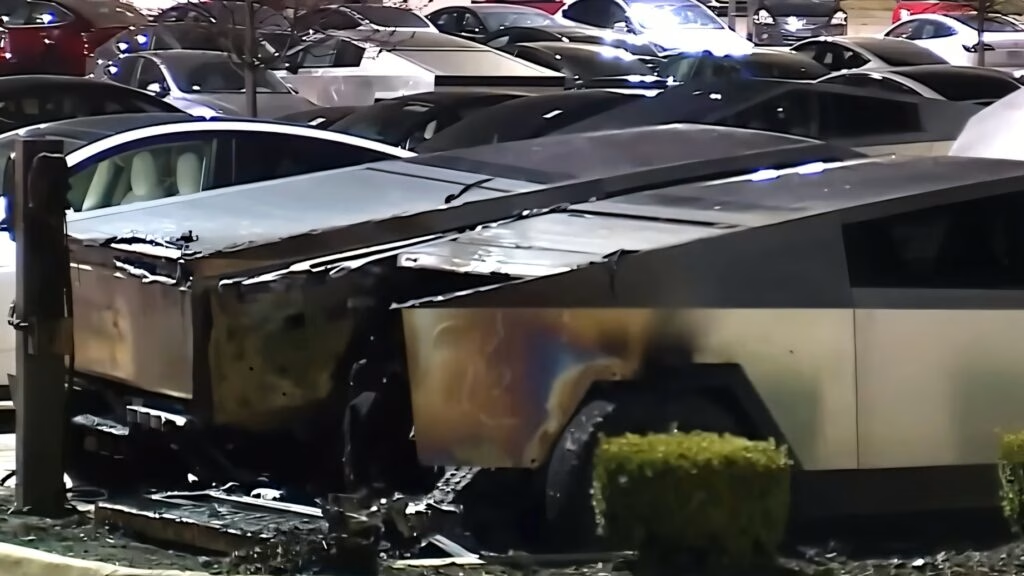A 19-year-old student from the University of Massachusetts Boston, Owen McIntire, is facing serious legal trouble after allegedly setting a Tesla Cybertruck on fire at a local Tesla facility in Kansas City. This incident, which occurred on March 17, has drawn significant attention from law enforcement and the public alike, highlighting the increasing tensions surrounding electric vehicles and their manufacturers.
What Happened During the Incident?
On that fateful night, around 11:16 p.m., a Kansas City Police officer noticed smoke billowing from a Cybertruck parked at the Tesla Center. Upon investigation, the officer discovered a Molotov cocktail burning nearby. Unfortunately, by the time the Kansas City Fire Department arrived, the fire had spread to a second Cybertruck and damaged two charging stations. The rapid escalation of the fire raised alarms about the potential dangers of such acts, not just to property but also to public safety.
Authorities quickly labeled the incident as a “violent criminal act.” Dan Driscoll, the Acting Director of the Bureau of Alcohol, Tobacco, Firearms, and Explosives (ATF), emphasized the severity of the situation, stating that this was not mere vandalism but a deliberate and dangerous act of arson. The use of Molotov cocktails as a weapon underscores the seriousness of the crime and the potential for harm.
What Are the Legal Implications?
McIntire now faces federal charges, including unlawful possession of an unregistered destructive device and malicious damage by fire of property used in interstate commerce. These charges carry significant penalties, with the possibility of spending decades behind bars. U.S. Attorney General Pamela Bondi has made it clear that individuals engaging in such acts will not escape prosecution. Her stern warning serves as a deterrent to others who might consider similar actions against Tesla or any other property.
The legal ramifications extend beyond McIntire’s case. This incident is part of a broader trend of attacks on Tesla facilities and vehicles. Just a week prior, another suspect was arrested in connection with similar acts of vandalism. FBI Director Kash Patel has condemned these actions, stressing their dangers and the commitment of law enforcement to hold those responsible accountable.
Why Is This Incident Significant?
The attack on the Tesla Cybertruck is more than just a criminal act; it reflects the growing divide in public opinion regarding electric vehicles. As Tesla continues to push the boundaries of automotive technology, it has also become a lightning rod for criticism and controversy. This incident raises questions about the motivations behind such attacks. Are they fueled by a genuine disdain for electric vehicles, or do they stem from broader societal issues?
Moreover, the incident highlights the challenges faced by companies like Tesla as they navigate a rapidly changing automotive landscape. As electric vehicles gain popularity, the backlash from certain groups may intensify. This could lead to more incidents of vandalism or violence, which not only threaten the safety of employees and customers but also impact the brand’s reputation.
What Can We Learn from This?
As we reflect on this troubling event, it’s essential to consider the broader implications for society and the automotive industry. The rise of electric vehicles is inevitable, but so is the need for constructive dialogue around their adoption. Engaging with critics and addressing their concerns can help mitigate tensions and foster a more inclusive conversation about the future of transportation.
Additionally, this incident serves as a reminder of the importance of community safety and the role of law enforcement in protecting public spaces. As electric vehicles become more prevalent, ensuring that facilities and infrastructure are secure will be crucial in preventing similar acts of violence.
In the end, while the legal proceedings against McIntire are just beginning, the implications of his actions will resonate far beyond the courtroom. It’s a stark reminder of the complexities surrounding the transition to electric vehicles and the societal challenges that accompany such a significant shift.

